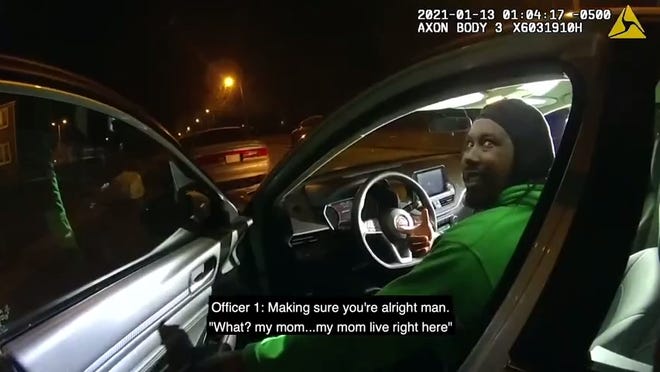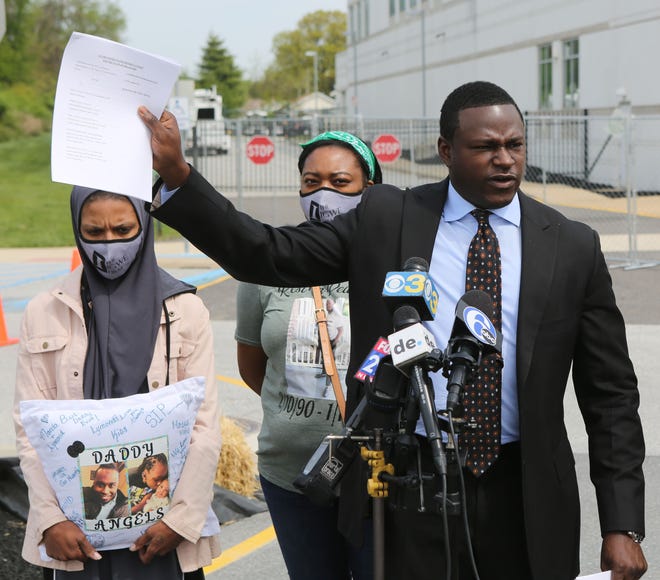The New Castle County police officers who shot and killed 30-year-old Lymond Moses in early January have been cleared in the shooting, though an outside review of the incident concluded that Moses’ death “could have been avoided if better policing tactics were employed.”
In a report published Monday by the Delaware Department of Justice, the agency’s Division of Civil Rights and Public Trust unit and law firm Morgan, Lewis & Bockius found that Patrolman Roberto Ieradi and Cpl. Robert Ellis were justified in shooting Moses as he appeared to drive toward them on the morning of Jan. 13.
Morgan Lewis wrote that “there is credible evidence that the two officers who fired their weapon reasonably believed that doing so was necessary to protect either themselves or others against death or serious physical injury” – the legal standard under Delaware law.

While the report continues a pattern of Delaware officers being cleared in use-of-force incidents, its recommendations for changes to police training and policy are unique. The review by an outside firm, as well as a policing expert who was called in at the request of Attorney General Kathy Jennings, is also atypical.
BACKGROUND: New Castle County releases body cam footage of fatal police shooting
Moses’ family attorney Emeka Igwe said the family was “incredibly disappointed,” but “not surprised by the report, given the lack of accountability for officers here in Delaware.”
Lakeisha Nix, Moses’ sister, echoed Igwe.
“The whole public saw that Lymond was simply trying to get away,” Nix said. “He didn’t deserve to be murdered.”
Igwe also vowed to “continue in our quest for justice for the Moses family both through the U.S. Attorney’s Office and in the civil court system.”
How the shooting unfolded
The shooting occurred in Wilmington’s Riverside neighborhood about 1 a.m. on Jan. 13.
According to Monday’s report and previous statements by county police, officers were “proactively patrolling” the area – which is in Wilmington police’s jurisdiction – following a “significant increase in the number of vehicles stolen from within New Castle County,” many of which were later found in the city’s Riverside community.
Wilmington police have not said if they were contacted ahead of time about the county’s investigation or if they were involved in the matter. Monday’s report did not address these questions.
During the patrol, officers saw Moses’ car parked on the side of Rosemont Avenue in gear with its engine running and dome light on. Body camera footage released in March shows Moses asleep behind the wheel.
The footage shows Ieradi reach into the car through the driver’s side window and turn off the ignition with a baton. Ellis approaches the passenger side, while a third cop, Officer Sean Sweeney-Jones, stands behind Ellis on the passenger side.

When police wake Moses up, he appears “agitated, confused and was sweating profusely,” Monday’s report said. Police told investigators this led them to believe he was under the influence.
A toxicology report conducted after the 30-year-old’s death found lethal amounts of fentanyl in his system, which a Delaware medical examiner said was “much higher than levels seen in other deaths.”
Toxicology results also showed an antihistamine in Moses’ system, as well as norfentanyl – a metabolite of fentanyl – which indicated that “Moses’ body was breaking down the fentanyl prior to death and the fentanyl was recently ingested.”
It is rare for the public to be provided with toxicology reports in Delaware. It was also unusual for New Castle County to release the body camera footage before the completion of police and the state Justice Department’s investigations.
RELATED:
This law shields police in Delaware from public scrutiny. But it didn’t start out that way
Decision to release body cam footage ignites debate; here’s why activists say it’s important
The footage shows the officers speaking with Moses, who gets upset and drives off. The officers jump in their patrol vehicles and follow Moses, who drives down a dead-end street.
A county police press release later that day said Moses “made a U-turn and drove at a high rate of speed directly at the officers.”
“The officers subsequently discharged their firearms and struck the driver,” it said.
But the body camera footage appears to contradict the initial statement, showing Moses trying to drive around Ieradi, not at him. The car also appears to be angled away from Ellis when he shoots Moses.

Ken Cooper, a use-of-force expert and director of Tactical Handgun Training of New York, a facility that trains public safety and security officers, previously told Delaware Online/The News Journal that police acted correctly.
POLICING IN THE U.S.:Could a change in police mentality have prevented Lymond Moses’ death?
He reviewed the video and agreed with the officers’ initial de-escalation tactics, saying they smartly turned the car off. In the video, he said officers were obviously trying to calm Moses down.
Moses, Cooper said, became the escalator when he failed to comply, turned the car back on and fled. He said Moses’ car was “a 4,000-pound bullet.”
Use-of-force training, policies
While Monday’s report concludes that Ieradi and Ellis were justified in believing the car was so dangerous that deadly force was warranted, it admonishes the department’s policies and training when it comes to shooting at moving vehicles. It also cites errors in police communication during the quickly unfolding incident.
The report makes particular note of departmental policy that says “officers should make every effort to not place themselves in the path of a moving vehicle.”
When Ieradi got out of his patrol vehicle, the report said, he “moved away” from it “and situated himself approximately 28 feet in front of” Moses’ car.
Because of this, Ieradi “may not be in complete compliance with this policy, in that he did not take every effort to not place himself in the path of a moving vehicle.”
But the report also goes on to say that “even if an argument could be made that Officer Ieradi violated this policy, the State would have difficulty establishing that Officer Ieradi was properly trained on this policy.”
This is because though the policy has been in place since at least August 2017, “it appears none of the use of force training developed and presented by the Department to its officers ever covered this policy.”

The report notes that just a month before the Jan. 13, 2021, incident, county police officers took “2020 Control Tactics Legal Update and Use of Force In-Service” training that, according to the firm, didn’t mention the policy and “appears to directly contradict the spirit of this policy.”
“The significance of this training is that rather than train the officers on the New Castle County Police Department’s specific policy restricting shooting at a moving vehicle, the instructor decided instead to criticize a template policy that mirrors the county policy.”
The report from Morgan Lewis recommends changing how trainings are taught, to focus on “teaching officers what are appropriate and inappropriate uses of force” rather than on their “legal risk and potential liability.”
The report also suggests the county strengthen its policy regarding shooting at moving vehicles. While the agency earlier this year did implement such a policy, Morgan Lewis’ attorneys wrote that “the existing policy provides a level of flexibility and officer discretion that reduces the effectiveness of this policy.”
By shooting at Moses, the report said, Ieradi “not only killed Mr. Moses, but arguably put his fellow officer in harm’s way.”
“Mr. Moses’s vehicle did not veer toward Cpl. Ellis until Mr. Moses was shot in the head, disabling him and causing him to lose control of the vehicle,” the report said.
Facing a federal lawsuit
Moses’ family and attorneys have repeatedly said the footage shows a “wrongful and unjustified” shooting.
During a late April press conference announcing a federal lawsuit filed by the man’s family, attorney Emeka Igwe said, “It’s clear that this case was a murder.”
THE LAWSUIT:Lawsuit filed by family of Lymond Moses seeks damages. Calls on FBI to investigate.
He and Moses’ family called on federal officials to look into the shooting. The suit claims that New Castle County, its Police Department, Public Safety Department and the three officers violated Moses’ rights.

It also says the officers lacked the proper training to handle the incident, which contributed to his wrongful death.
The suit additionally claims the county “was aware of a need for more and different training” and that it “specifically knew that its officers needed specific training on excessive force and de-escalation practice.”
MORE: Delaware NAACP wants US attorney general to look into Lymond Moses police shooting
While Monday’s report does not directly address the department’s policy regarding de-escalation, it does discuss how the three officers communicated with Moses and then each other during the incident.
Morgan Lewis’ attorneys found that when Ieradi and Ellis first woke Moses up, they were “speaking simultaneously over each other,” which the report said likely made Moses more confused and less likely to comply with officers.
Then, once Moses drove away, Ieradi, Ellis and Sweeney-Jones didn’t communicate with each other while pursuing Moses about the road conditions or the “strategy for the pursuit and reengagement.”
Attorneys with Morgan Lewis wrote that New Castle County police, as well as other police agencies in Delaware, “would benefit from guidance … on the strategic placement of SUVs, when to leave one’s SUV when blocking a moving vehicle, and when to seek the support of additional officers.”

In addition to these policy and training recommendations, the report chastised the department for the “critical incident briefing” it included when releasing body camera footage to the public earlier this year.
In the briefing – and in a report submitted to the state Justice Department – county police gave “significant detail on Mr. Moses’s criminal history and character” despite the fact that the officers were not aware of Moses’ past when they encountered him.
Morgan Lewis’ attorneys wrote that they believe the department’s decision “to focus on the irrelevant details of Mr. Moses’s prior criminal history” undermined the ongoing criminal investigation “by prejudicing public opinion” and detracted from “the public’s ability to trust the integrity of the Police Department’s investigation of the shooting.”
“By focusing its statements on Mr. Moses’s prior criminal conduct … the police department was seemingly attempting to justify the shooting to the public based on its perception of the character of the victim instead of based on the tragic facts and circumstances that led to the shooting,” attorneys wrote.
“The police department’s attempt to devalue the life of Mr. Moses surely angered and disgusted many in the community and engendered greater skepticism of the good-faith nature of the investigation,” the firm added.
In light of this, Morgan Lewis’ attorneys recommended that New Castle County police and other law enforcement agencies consider bringing in independent agencies in the future to review police shootings and other use-of-force incidents.
READ: Why a Delaware judge ruled protests outside of deputy attorney general’s home may continue
This involvement, attorneys wrote, will “strengthen the rigor of these investigations,” while also developing public trust and confidence through the independent, third-party reviews.
“Involvement of an independent agency will also help address a culture prevalent at many law enforcement departments, such as New Castle County Police Department, where officers actively put themselves in harm’s way by unnecessarily escalating situations.”
Reporter Hannah Edelman contributed to this report.
Got a story tip or idea? Send to Isabel Hughes at ihughes@delawareonline.com. For all things breaking news, follow her on Twitter at @izzihughes_ Contact Esteban Parra at (302) 324-2299, eparra@delawareonline.com or Twitter @eparra3.